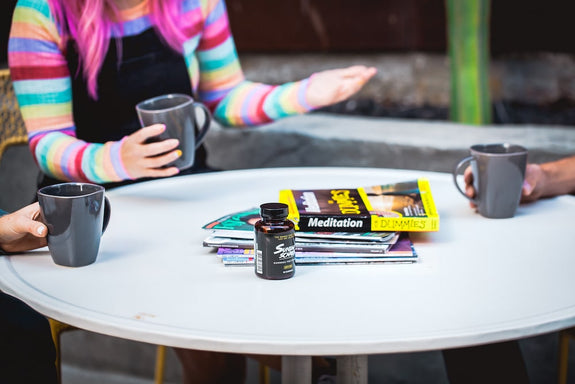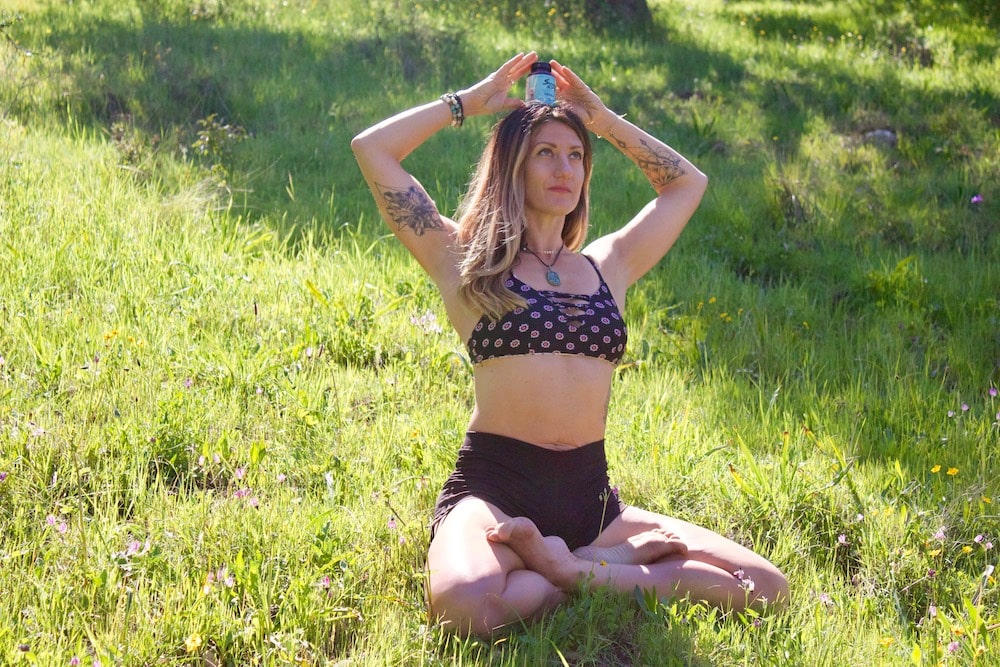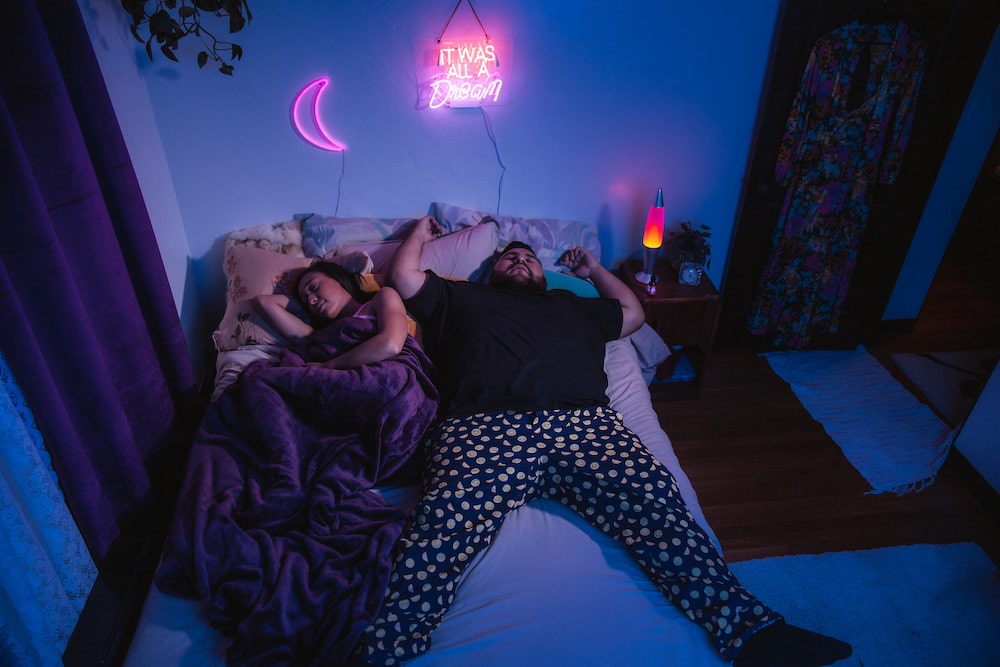A Beginner’s Guide to Meditation for Sleep & Anxiety: Tips for a Successful Practice

A Beginner’s Guide to Meditation for Sleep & Anxiety: Tips for a Successful Practice
So you're stressed out, you can't sleep, and you're itching to give meditation a chance but you have no clue where to begin?
Fear not, you're in the right place.
Meditation is like a magical wand for your mental health and overall well-being. It's all about simple hacks like channeling your mind onto one thing (like your breath) to achieve a state of zen and tranquility.
And guess what? Science says that consistent meditation can work wonders for your sleep issues, anxiety woes, mood regulation, and mindfulness.
In this blog post, I'll pull off the covers on how to kick your sleep issues and anxiety off the mattress through successful meditation practice.
Plus, I'll hook you up with some killer techniques to stay focused and conquer any challenges or frustrations that come your way.
The Benefits of Meditation on Sleep and Anxiety

Meditation has been shown to lower cortisol levels - the hormone associated with stress - which can improve sleep and reduce anxiety. It can also improve focus, memory, and creativity.
Practicing meditation on a regular basis can increase feelings of overall well-being and contentment. However, consistency is key.
The Top 4 Benefits of Meditation: Sleep Saviors & Anxiety Slayers
Improved Sleep Quality - The Scarefree Sedative
Getting insomnia in your 30's is as normal as not knowing how to do your taxes. Meditation is the lullaby your restless mind craves. It helps clear your thoughts before bed, so you don't keep conjuring up scenarios in your head that don't even exist.
Stress Reduction - The Anxiety Assassin
Anxiety, meet your match. With regular meditation, you command your inner ninja to chop those anxiety levels down to size. You’ll be cool, calm, and collected, even when life throws its curveballs. The more you practice in solitude, the more automatic the effects will take place during daily life episodes.
Emotion Regulation - The Mood Magician
Turn that frown upside down. Meditation is the wand-waving, top-hat-tipping maestro of mood magic. One moment you're a grouchy ogre, the next you're all sunshine and rainbows. Meditating encourages you to detach, helps you recognize that there are universal powers out of your control, and gives you the wisdom to surrender to your emotions to them.
Improved Concentration - The Memory Maestro
Get ready to finally remember where you put your car keys. With meditation, you'll have the memory of an elephant and the focus of a laser beam. You'll be nailing those daily tasks and remembering birthdays like a champ. Meditation helps you become aware and truly "arrive", so you no longer feel distracted or disengaged.
The Benefits of Meditation at Work: Banish Burnout
Not only is meditation a great tool for personal well-being, but it can also be beneficial in the workplace, especially with regards to workplace burnout.
Here are a few benefits of practicing meditation during work hours:
Increased focus and productivity:
Say goodbye to procrastination and hello to getting things done. A study published in the Journal of Cognitive Enhancement found that regular meditation can lead to significant improvements in sustained attention and cognition. To put it simply, meditation can turn you into a productivity powerhouse, helping you churn through that to-do list with the focus of a hawk and the speed of a cheetah. But without the caffeine jitters.
Reduced performance anxiety:
No more sweating bullets before that big presentation or during that quarterly review meeting. A study by the University of Miami found that individuals who practiced meditation experienced less performance anxiety and improved cognitive function, making them more confident and effective in stressful situations.
Improved decision making:
Meditation helps clear your mind of clutter, allowing you to think more clearly and make better decisions. It also increases self-awareness and emotional regulation, making it easier to handle difficult situations with a level head. A study by Zeidan, F., Johnson, S. K., Diamond, B. J., David, Z., & Goolkasian, P. showed that a short course of mindfulness meditation training improved participants' working memory capacity and the ability to sustain attention, which are essential components of effective decision-making.
So go ahead, take a few minutes out of your work day to meditate and watch your productivity skyrocket.
You can choose the break room, sit outside on the lawn of the office courtyard, or even spend ten minutes in your car if you don't want to be seen. Work from home? Even easier.
How Does Meditation Work: Unraveling the Bewitching Brain Magic

Alright, time to unravel this hocus-pocus spell that meditation casts on your brain. So, bear with me as we take a trip down the rabbit hole of ancient wisdom and modern science.
According to the sages of yesteryear, meditation is the art of mastering your mind. It's about harnessing your inner Gandalf and telling those stress-filled thoughts: "You shall not pass!"
But how does this work in the real, non-Middle-earth world? Well, let's ask science.
Several studies have shown that when you meditate, your brain waves switch to a frequency analogous to deep relaxation or even sleep.
This state, called the alpha state, is where the magic happens. Your heart rate slows, your breathing deepens, and your muscles relax.
Essentially, you're giving your body the "All clear, we can chill now" signal. This state helps to reduce stress and anxiety, making you feel as mellow as a sloth on a Sunday afternoon.
Furthermore, research from Harvard Medical School reveals that consistent meditation actually changes the structure of your brain.
Over time, it thickens the areas associated with mind-body awareness, stress regulation, and self-awareness. Imagine it as a gym session for your brain, minus the sweat and muscle soreness.
Finally, remember that ancient wisdom thing we mentioned? Well, according to Buddhist philosophy, meditation helps us to see the world as it truly is, without the lens of our fears and worries.
It's about realizing that most of our stress and anxiety come from our reactions to events, not the events themselves. So, in essence, meditation helps us to respond rather than react, making us as cool as a cucumber in a bowl of hot sauce.
Now that you understand how meditation works to combat stress and anxiety, you can start using this powerful tool to conquer your fears, sleep like a baby, and tackle life with the confidence of a lion.
What Famous Wellness Experts and Spiritual Leaders Say About Meditation for Sleep & Anxiety
Oh, you thought you were the only one aboard the meditation train? Hell no. This locomotive is packed with famous wellness gurus and enlightened spiritual leaders who are all head over heels for the magic of meditation.
Oprah Winfrey
The queen of daytime TV and self-proclaimed spiritual junkie, Oprah, credits meditation with helping her maintain her sanity amidst the whirlwind of celebrity life. Her mantra?:
"Meditate, sleep, let go." Simple, yet effective.
Deepak Chopra
A leader in mind-body medicine and an advocate for the integration of Western medicine and natural healing traditions, Deepak's take on meditation for sleep and anxiety is as profound as it is practical:
"Meditation is not a way of making your mind quiet. It’s a way of entering into the quiet that’s already there – buried under the 50,000 thoughts the average person thinks every day."
Thich Nhat Hanh
Acclaimed Vietnamese monastic and Zen master, Thich Nhat Hanh, known for his profound wisdom and mindfulness teachings, provides a transformative perspective on meditation:
"Feelings come and go like clouds in a windy sky. Conscious breathing is my anchor. When the storm of anxiety comes, my breath is my anchor, calming the seas within."
Eckhart Tolle
Bestselling author and spiritual teacher, Eckhart Tolle, known worldwide for his profound insights, shares his understanding of meditation's role in quieting the mind:
"Stress is caused by being 'here' but wanting to be 'there'. Meditation simply brings you back 'here', to the present moment, reducing stress and anxiety by grounding you in the now."
Mike Sill
CEO and Co-founder of Sunday Scaries and anxiety guru, Mike Sill, shares his own understanding of meditation for sleep and anxiety:
"Falling asleep is incredibly hard for me. I've tried eliminating coffee from my diet, totally blacking out my room, putting my phone away an hour before bed to avoid blue light, and everything under the sun. What prevents me from sleeping the most is that little voice in my head that will keep encouraging me to 'distinguish' every problem in my life. Meditation helps get me into a state before bed where I'm no longer in fire fighting mode."
Michael Singer
Michael Singer, author of the bestselling book "The Untethered Soul," sums it up perfectly:
"Meditation is not trying to change or fix anything; it's simply falling in love with your own inner silence."
So there you have it - the secret spell to a calmer mind and a happier heart. Practice mindfulness meditation and use it as your trusty wand to ease anxiety and get a good night's rest.
Where to Start: Creating a Plan to Cure Your Sleep Issues & Calm Anxiety

So, you want to establish a consistent meditation practice, huh?
Well, here are some tips to help you create a successful meditation plan (because planning is the key, right?):
1. Develop a Daily Schedule:
Yup, don't just wing it. Set aside some precious time each day just for your meditation. Don't forget to schedule it in your calendar or set a reminder on your phone. Usually mornings before you get out of bed or nights before you fall asleep work best, but make it consistent.
2. Find the Perfect Location:
Oh, the quest for the perfect meditation spot. Look for a quiet, peaceful place where you can feel comfy and free from distractions. It could be a cozy corner in your bedroom or in nature's serenity at the beach.
3. Design the Space with Minimal Décor
Remember, less is more. Keep your area simple and decluttered. Ditch the excess decorations and embrace the minimalist vibe. Maybe light a candle or burn some incense to set the mood. Draw a hot bubble bath for yourself or setup a tent in your back yard.
4. Choose a Guided Meditation App:
Because let's face it, we're not all reincarnated monks. For beginners or those who struggle to focus, a guided meditation app can be a lifesaver. They offer step-by-step instructions and a slew of meditation options for different moods and needs. So download one, hit play, close your eyes, and let the app do its Zen thing.
5. Start with Small Sessions:
Rome wasn't built in a day, and neither is a meditation habit. Don't go setting marathon goals from day one; you'll only end up feeling frustrated. Start small, 5 to 10 minutes per session, and gradually lengthen the time as your meditation muscles grow stronger. Remember, it's not about how long you meditate, but how consistently. So strap in, breathe, and let the slow and steady race to tranquility begin.
Relaxation Techniques: A Guided Sleep Meditation & Stress Hacks

1. Deep Breathing:
Sit back, relax, and take a deep breath. Sounds easy, right? Well, your body thinks so too. Deep, slow breathing tells your brain to chill out and that it's not a caveman running from a saber-toothed tiger anymore. So breathe in for 4 counts, hold for 7, and exhale for 8. Soon enough, you'll be sleeping like a baby. Or a sloth. Whichever is cuter.
2. Progressive Muscle Relaxation:
Remember the game of 'tight squeeze, no squeeze' we used to play as kids? This technique is basically the grown-up version of that. Start from your toes, gradually working your way up to the scalp, tensing and then releasing each muscle group. It's like giving your body a 'heads-up' to stop stressin' and start restin'.
3. Visualizing Your Happy Place:
Imagine lounging on a beach, soaking up the sun, and sipping on a pina colada. Feel better already, don't you? Visualization is a powerful tool for calming your mind and getting it ready for bed. Whether it's a tranquil forest or a serene lake, picturing a peaceful place can help you shut down the weekday worries and tune into the weekend zen vibes.
4. Mindful Body Scan:
This isn't the airport security kind of body scan. No pat downs or metal detectors involved. It's about paying attention to different parts of your body, noticing any sensations, aches, or tensions. It's like giving your body the red carpet attention it always craved but never got.
5. Guided Imagery:
This is like visualizing your happy place, but on steroids. Here, you listen to someone else describe a peaceful scene or guide you through a story. It's like bedtime stories for adults. Because, let's face it, who doesn't like a good story before bed? Whether it's a gentle voice guiding you through a magical forest or a calm speaker narrating a soothing sea voyage, this technique can help you unwind, relax, and fall asleep faster than you can say "sweet dreams."
Overcoming the Meditation Misgivings: The 5 Disruptors
It's not all Yoda vibes in the land of meditation. Often, the journey is dotted with challenges and frustrations. But hey, guess what? We've got you covered.
Here are some common meditation hiccups along with their antidotes:
1. "I can't sit still for that long!"
It's okay, you're not the only one with ants in your pants. The solution? Start small. Try a 5-minute meditation. Once you're comfortable, you can gradually increase the duration. Baby steps, my friend, baby steps.
2. "My mind is constantly buzzing!"
Welcome to the human club! Our minds are chatterboxes. During meditation, don't fight the thoughts, observe them. Over time, you'll notice the chatter quieting down. Practice makes perfect.
3. "I'm not feeling anything different"
Rome wasn't built in a day, and neither is your Zen mastery. Consistency is key here. So stick with it and give it some time. The benefits of meditation are often subtle and cumulative.
4. "I keep falling asleep!"
That's okay, it means you're relaxed! But if you want to stay awake, try sitting up or doing a walking meditation. And maybe skip that pre-meditation turkey sandwich next time.
5. "Meditation is boring"
If traditional meditation isn't cup of your tea, try our guided meditation or a sound bath. Add some variety and keep it interesting. Meditation is like exercise in that at first it seems daunting and like a chore, but once you get in the groove you can't live without it.
Remember, every challenge is an opportunity for growth. So, keep calm and meditate on.
Beating the Sunday Scaries with Meditation: Your Ticket to Funday Mondays

Ah, the Sunday Scaries. That sinking feeling of dread that seeps into your soul as the weekend winds down. It's a cocktail of anxiety, hangover, and the impending doom of Monday's to-do list.
But guess what? It's all in your head. Literally. It's your brain's way of dealing with the transition from the weekend's bliss to the week's hustle. It's as real as Big Foot and just as mythical.
Now, let's talk about meditation and its magic powers in banishing these Sunday Scaries.
Meditation, with its deep roots in mindfulness, gives your mind the tools to tackle stress, anxiety, and fear head-on. It’s like a spa treatment for your mind, providing you with a much-needed moment of calm in the eye of the Sunday storm.
By focusing on the present moment, meditation helps to interrupt the endless cycle of worry about the future (a.k.a Monday). It enables you to step back, observe your thoughts without judgment, and let go of the unnecessary mental baggage.
It's like decluttering your mind, leaving behind only what truly matters.
Moreover, meditation can transform your perception of time. It helps you to slow down and appreciate each moment, thereby expanding your weekend and making Monday seem a little less scary.
So, next time the Sunday Scaries start creeping in, just sit back, breathe, and let meditation do its magic. Because remember, Sundays are for rest, relaxation, and rejuvenation, not for stress and scare.
How CBD Can Aid Your Meditation Practice: The Sleep & Stress Elixir

Now, let's talk about CBD, the little plant compound that's making big waves in wellness circles. CBD, or Cannabidiol, is a non-psychoactive component of cannabis.
Translation? It won't get you high. But it will offer a host of other benefits that can enhance your meditation practice.
Firstly, CBD is a known calming agent. It interacts with the body's endocannabinoid system to help maintain balance and stability. Think of it as a kind of biological dimmer switch, turning down the dial on stress. This can make it easier for you to settle into your meditation practice, especially if your mind tends to race like a hamster in a wheel.
Secondly, CBD can help with sleep. Various research has shown that CBD may increase overall sleep amounts and reduce those restless nights. So, if you're incorporating night meditation into your bedtime routine to help you drift off to dreamland, adding CBD into the mix might just be the cherry on top.
There are also CBD sleep oils that are enhanced with CBN.
Now, you're probably wondering, "What on earth is CBN?" Well, buckle up, because you're about to get schooled. CBN, or Cannabinol, is another component of cannabis. Think of it as CBD's lesser-known but equally cool cousin.
CBN has been getting a lot of buzz lately for its potential sleep-inducing effects. So, if your nights are more tossing and turning than peaceful slumbers, CBN might just be your new best friend.
When paired with CBD, it forms a dynamic duo that can lead even the most stubborn insomniac to dreamland.
So, as you can see, adding CBN to your meditation routine is like adding an extra layer of serene to your zen cake. It's the perfect recipe for a good night's sleep. And better sleep means better mornings.
Lastly, CBD can potentially alleviate physical discomfort. If you're finding it hard to concentrate during meditation because of niggling aches, CBD may be able to help.
It's been widely recognized for its potential swelling-reduction benefits, so you can sit (or lie) comfortably and focus on your mindfulness journey.
So, whether you're a meditation newbie or a practiced yogi, CBD gummies could be the secret sauce that takes your meditation routine from meh to magnificent.
The Conclusion: A Peaceful Drift Off
So, there you have it. We've taken you on a whirlwind tour of meditation for anxiety and sleep, given you techniques to conquer frustration & challenges, taken on the Sunday Scaries, and even dipped our toes into the calming waters of CBD and its sleepy cousin CBN.
Not to mention, we've given you a glimpse into the promising potential of sleep guided meditation.
In conclusion, meditation, in its many forms, is a powerful tool for wellness. Whether it's dealing with workplace burnout, calming a racing mind, fending off the pesky Sunday Scaries, or aiding a good night's sleep, meditation is here to soothe and support.
Plus, you can add a dash of Big Spoon the CBD + CBN Sleep oil, and you'll be sleeping like the little spoon again in no time.
Now go get your zen on.
Ready to fight the Sunday Scaries? Shop our CBD Gummies for Focus, CBD Candy, CBD Treats for Dogs, CBD Gummies, CBD Oil Tinctures, CBD Sleep Oil, Extra Strength CBD Gummies, Delta-9 THC Gummies, CBD Edibles, and Vegan CBD Gummies online today!

 CBD Gummies
Stress Relief
CBD Gummies
Stress Relief
 Extra Strength CBD Gummies
Stress Relief
Extra Strength CBD Gummies
Stress Relief
 Vegan CBD Gummies
Stress Relief
Vegan CBD Gummies
Stress Relief
 CBD Gummies for Focus
Focus Boost
CBD Gummies for Focus
Focus Boost
 CBD Candy
Mood Lift
CBD Candy
Mood Lift
 CBD Oil Tinctures
Stress Relief
CBD Oil Tinctures
Stress Relief
 CBD Sleep Oil
Sleep Aid
CBD Sleep Oil
Sleep Aid
 CBD Dog Treats
Stress Relief
CBD Dog Treats
Stress Relief
 Side Piece Bundle
Stress Relief
Side Piece Bundle
Stress Relief
 Rando Bundle
Rando Bundle
 Delta-9 THC Gummies
Euphoria
Delta-9 THC Gummies
Euphoria
 THC Gummies for Sleep
Sleep Aid
THC Gummies for Sleep
Sleep Aid
 Sunday Scaries® Snapback
Sunday Scaries® Snapback
 Sunday Scaries Shirt
Sunday Scaries Shirt
 Sunday Scaries Sweatshirt
Sunday Scaries Sweatshirt
 Dabbing Bear Blanket Jacket
Dabbing Bear Blanket Jacket



